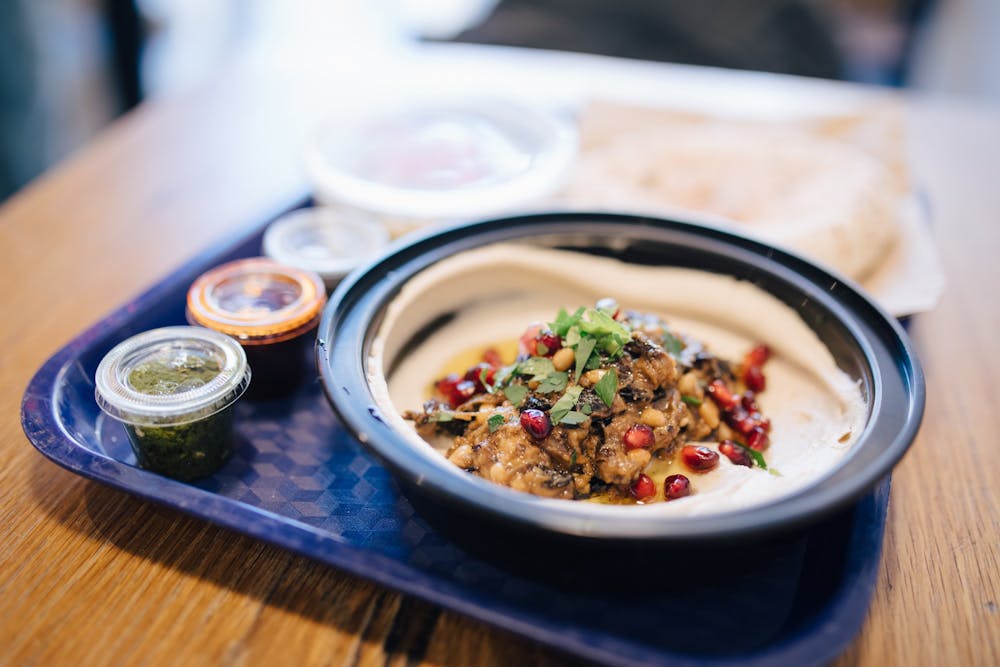In the far left corner of Franklin’s Table Food Hall, hot pink hues and and shelves of Israeli Soul cookbooks now occupy the space where Little Baby’s Ice Cream once stood. A neon–lit sign in the same rosy tone dons the name of the new vendor: DIZENGOFF. It's the only sign in the whole food hall that hangs on the outside of the seller’s booth itself, a detail that makes the Dizengoff name a beacon, a shiny gem even, amid this trendy foodie utopia. Dizengoff is unique, it’s brand spankin' new, it undeniably pops—but here’s the gag: its opening makes it the third storefront within a roughly two hundred foot radius that's owned by chef Michael Solomonov.
This is not a criticism—if anything, it's a testament to the greatness of Solomonov’s food empire. One of his restaurants, the beloved Federal Donuts, sits just behind the food hall on Sansom street. The other, Goldie, is also a vendor in Franklin’s Table. Both of these places are well–known campus favorites—and soon Dizengoff will doubtlessly achieve this status too. The booth offers four different styles of hummus platters ($10 for Classic Tehina, $12 for Eggplant and Lima Bean, $15 for Beef Cheek), two dollar drinks, and perhaps most notably, a brand–new dessert option not offered at any other Dizengoff location: the Frozen Labneh, which sells for $3 in any listed flavor. Grab–n–Go pints and half pints of hummus are also available for purchase ($5 and $9), as well as t–shirts, hats, and two different Solomonov cookbooks.

Simply put, the food at this new Franklin’s Table location lives up to the hype. The hummus is true, superior, Zahav–style hummus: thick and smooth and without any of the bitterness or tang that hummus sometimes features. The Eggplant option includes a hearty scoop of eggplant in the center, mixed with pomegranate seeds and roasted pine nuts and garnished with a pinch of cilantro. The eggplant is cooked with the perfect amount of oil, the pomegranate seeds’ sweetness is balanced by the richness of the pine nuts, and the spongy, freshly baked pita is the perfect vessel for scooping and soaking it all up. Every hummus platter comes with a side of mildly pickled vegetables that strikes a balance between salty and fresh, and various spices are free to add upon request. Harif is the red, smoky hot sauce, schug is the green, sharp hot sauce, and za’atar is a dry combination of Middle Eastern spices, without which this plate would feel incomplete.

The main course was expectedly lovely. But the star of the show, also expectedly, was the Frozen Labneh. Labneh is a versatile staple of Middle Eastern cuisine that falls somewhere between a Greek yogurt and a strained cream cheese—and it's usually used in a savory capacity. The decision to freeze it and serve it as a dessert is definitely experimental, but the payoff is a tremendous new menu item that is hard to find anywhere else.
Dizengoff's Frozen Labneh is always composed of the same original labneh base, with the two other flavor options (Strawberry Shortcake and Chocolate Peanut) representing two different possible toppings. The base itself is something like frozen yogurt’s cooler, creamier, sexier older sister. It has that yogurt–y zing to it, but the aftertaste is somehow both sweeter and saltier. The Chocolate Peanut topping complements the labneh base wonderfully: the chocolate sauce hardens as it cools and provides a cocoa–ey depth that isn’t overpowering. The peanut is crunchy and salty, and seems to include some sesame crumbs that level it up. The dish is relatively small, but it's delicious, it's gourmet, and it's only three dollars.
While the entirety of this meal costs $15–steep for a lunchtime meal, especially if that meal is mostly just, well, hummus—it's easily one of the highest quality options for on–campus noshing. It was extremely filling, and unsurprisingly top–notch. Thank you, Mr. Solomonov. You have my express permission to continue taking over the world.







